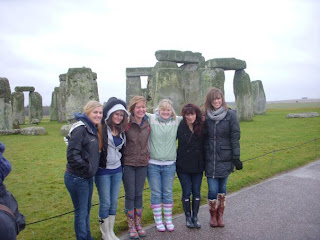 |
| Shinsaibashi, Osaka, a lively shopping district |
Joshua Kaplan ‘13
What is your major?
East Asian Studies with a minor in Japanese.
Why did you decide to study abroad?
I wanted to have a more multifaceted understanding of the
world through a rich base of knowledge about other cultures and high-level fluency
in another language. Furthermore, studying for two semesters in Japan allowed
me to delve deeply into the famously difficult and time-consuming Japanese
language.
Why did you choose the Kansai Gaidai program in Osaka, Japan?
I would say three main reasons: 1) I knew Kansai Gaidai’s
language teachers (some of whom wrote the Genki
textbooks) to be very good, 2) I wanted to live with a host-family to get the
fullest Japanese experience possible, and 3) With Kansai Gaidai’s central
location, I would be able to see a large variety of both traditional temples
and shrines in the nearby ancient capitals Kyoto and Nara (home to numerous
world heritage sites) and the modern attractions of the large cities Osaka and
Kobe. Also, living in Osaka allowed me to get into the distinct local dialect
made popular by the manzai comedians,
and regional foods like takoyaki
(fried octopus balls) and okonomiyaki
(a pancake-shaped slab of cabbage, ginger, egg, bacon, or “whatever-you-like”).
What was your living situation like?
I lived with a
host-family who basically considered me one of their own. My host-family was a
married couple in their 60s with two very cute Maltese dogs, and occasionally
the daughters (adult-age) and young grandchildren (also very cute) would visit.
I had my own room in the small but cozy Japanese house, getting used to the
warmth of my kotatsu (heated table)
and sleeping on a futon.
My host-mom’s
authentic cooking was also amazing. Between fresh raw squid (my host father
likes the eyes) and nattou (fermented
soybeans), there were a few things I was less interested in, but I also
discovered a multitude of delicious new foods I might not have otherwise experienced:
temaki-zushi (make-it-yourself
sushi), Japanese-style spaghetti (with plenty of seafood sauce, octopus
tentacles, and shrimp), maabou-doufu (a Japanese take on the Sichuan Chinese
spicy tofu).
 |
| Arashiyama, Kyoto |
Highlights/challenges of the program
There were many
highlights for me, including the excellent language teaching and cuisine, but
perhaps most important to me were the social connections, making Japanese,
American, and other friends from around the world. I could relate to and work
together with international friends also studying Japanese. And as my Japanese
skill level grew, I became able to have progressively deeper conversations with
Japanese friends in their native language.
For me, the biggest challenge appeared when I
interacted with Japanese people in the outside world who didn’t know how to
respond to my race, immediately assuming that I had no language skills and that
I needed assistance because I am not Japanese. Of course, it could be helpful
on some occasions, but it took practice not to find it insulting, but humorous.
In the end, remembering the way my Japanese friends accepted me and were aware
that I can get by fine with my language abilities gave me encouragement.
 |
| Odaiba, Tokyo, a view of Rainbow Bridge at sundown |
|
Advice you wish you had been given before going on your
program
Japan is an
advanced nation that has or imports probably anything you might need. Of
course, some foods are harder to find but still available in international
grocery stores like “Meidi-ya” (meiji-ya明治屋)
in Shi-jou, Kyoto city. I wish I would have known earlier that buses to major
cities like Tokyo and Hiroshima are far cheaper than the bullet train, and can
be reserved by travel companies like the one in the convenience store in Kansai
Gaidai’s main campus. I also think it’s useful to know about Japanese
communication styles, which can rely more on intuition and trust than direct
honesty and clarity. For example, instead of clearly saying that the
air-conditioner is on too high, someone might simply say “it’s a little
chilly,” implying that it’s on too
high, and that you should turn it down because it’s wasting money. Nonetheless,
rather than just memorizing rules and stereotypes, use your senses and observe
what linguistic and social patterns native Japanese employ in their own country
—at least knowing them can help greatly.
Additional comments
There really are a
lot of wonderful fun things to do while you study abroad, but finding out about
them is the first step. Take time to make local and other international
friends, ask various people what to do, check out internet guides and
recommendations, and talk to past participants (like me!) and teachers. And,
most of all, be willing to try whatever comes up —even if it sounds strange or
boring, it might be your only chance while abroad. I loved picking up brochures
at the train station and checking out travel books in bookstores, which let me
find fantastic festivals, art exhibitions, hiking trails, shrines, temples,
restaurants, and so much more.
If you have questions about the Osaka Program, you can find program alums on the Ask An Alum Moodle page by clicking this link.


















